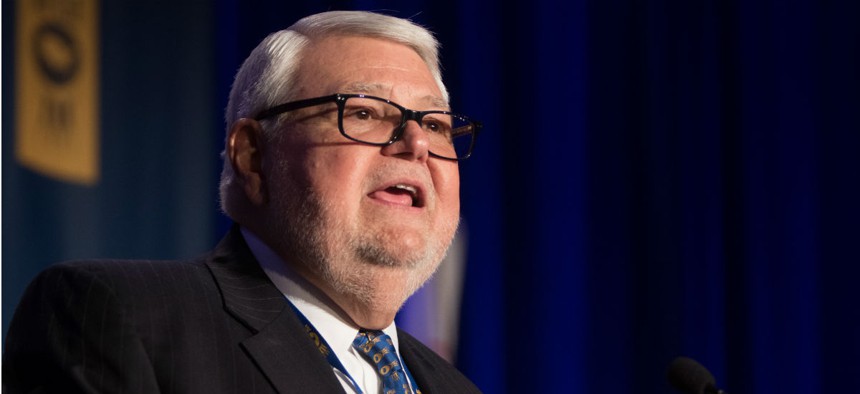
AFGE National President J. David Cox said talks between the union and management have started again, though he could not provide details. AFGE
Labor Relations Authority Finding Provokes 'Preliminary Talks' Between Education, Union
American Federation of Government Employees examines alternate avenues to pursue complaints against management.
Officials with the nation’s largest federal employee union said that Education Department leaders have reached out to labor attorneys as the result of a recent finding by the Federal Labor Relations Authority.
Last week, the FLRA preliminarily found that the American Federation of Government Employees’ unfair labor practice complaint against the Education Department held merit. In March, the department unilaterally imposed a new contract on the union, cutting dozens of negotiated workforce policies, including telework and employee protections. In justifying their decision, Education leaders said AFGE had been “dragging its feet” on ground rule negotiations for a new collective bargaining agreement.
On Tuesday, AFGE National President J. David Cox said that since the decision, some discussions between the union and management have restarted, although he could not elaborate on what was said.
“They’ve been communicating with one of our attorneys,” Cox said. “She’s had some preliminary conversations with the Department of Education [since the ruling].”
Ordinarily, a preliminary finding of merit to an unfair labor practice complaint encourages parties to return to the negotiating table to avoid a hearing before the full FLRA. But since the agency lacks a general counsel to bring complaints before the board, that incentive is now relatively toothless. Despite that, Cox said he was hopeful that Education officials would return to collective bargaining negotiations.
“Even without a general counsel, the [FLRA] regional director still has a lot of power and authority,” he said. “They investigated the complaint, they gathered the evidence, and if it goes to a court, they would be the prosecutor. They have a lot of power and authority to pressure an agency to come back and resolve the issues so that the unfair labor practice would be resolved or to reach a settlement agreement.”
That said, Cox said AFGE has begun exploring how it can use alternative mechanisms to pursue complaints against agencies, particularly as the Trump administration continues to implement its controversial executive orders to make it easier to fire federal workers and reduce the influence of unions in agency operations. Last week, a federal judge heard oral arguments in a legal challenge to the orders, and Cox said he anticipates a decision within the next month.
“We’ve run into all types of trials and tribulations with various administrations, and with this Congress, we’ll keep fighting and we will work to represent our people,” he said. “If we can’t get success through the FLRA, we still have grievance arbitration rights, [Equal Employment Opportunity] rights, the Office of the Special Counsel, and other avenues to take things into court.”
And in some instances, the union may elect to take complaints directly to civil litigation, Cox said. Federal employment lawyers have suggested this as a possible avenue for unfair labor practices if the Trump administration elects to keep the FLRA general counsel post vacant.
The Education Department did not respond to request for comment.







